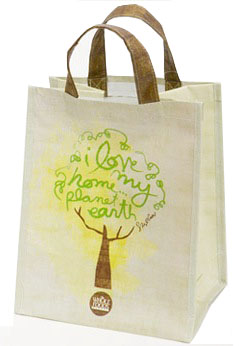 Courtesy Whole Foods
Courtesy Whole FoodsThey can take over 1,000 years to decompose and are among the most common debris items found in coastal cleanup operations.‘
Yet over 380 billion plastic bags, sacks and wraps are consumed by American shoppers each year, according to the Environmental Protection Agency (EPA). Of that, only about one percent of plastics are recycled annually.
In response to these concerns, supermarket retailers nationwide are urging shoppers to replace plastic bags with reusable totes made from nylon, cotton canvas, hemp, woven polypropylene or recycled plastic.
‘It’s one of those easy, feel-good things. It’s like, ‘I can’t do those big things like buy a hybrid car, but I can do these sorts of little green things,” said Vincent Cobb, founder of Reusablebags.com, in a recent interview with Melissa Heckscher of The Los Angeles Daily News.
Typical plastic bags, made from high density polyethylene and petroleum, break down into smaller particles before their eventual absorption into soil and waterways, according to the EPA. This can present a danger to animals ‘- particularly to birds and marine mammals ‘- who often mistake particles of plastic for food.
Reusable tote bags provide an eco-friendly alternative for shoppers. Typically available in supermarkets and retail stores from 50 cents to $2.99 per bag, one reusable tote has the potential to replace nearly 1,000 plastic bags over its lifetime, according to The Boston Globe ‘- but that is only if shoppers can remember to use them.
‘I’m always leaving the bag in my car, and then I’ll be out shopping, and I’ll remember that I was supposed to bring it in,’ said Rachel Beaulieu, a senior at the
Beaulieu purchased a reusable tote bag from Trader Joe’s in an effort to ‘go green,’ but now says that cutting plastic bags out of her life hasn’t been so simple.
‘I’m used to bags being inside the store. I hate leaving in the middle of shopping just to grab a bag, so most of the time I usually don’t bother using it,’ said Beaulieu.‘
Supermarket retailers have created incentive programs intended to help shoppers like Beaulieu learn to incorporate reusable tote bags into their regular shopping routines.
Trader Joe’s spokeswoman Alison Mochizuki, said in an e-mail that the store’s BYOB [Bring Your Own Bag] program offers shoppers the chance to win free Trader Joe’s groceries and gift cards.
While the practice of carrying reusable tote bags has burgeoned in recent years, it has also grown pricier as many high-end fashion retailers have moved to capitalize on the eco-friendly trend.
In 2007, Hermes designed Silky Pop, a canvas tote bag made of organic silk material, which retails for $960. At Barney’s
Carrying reusable tote bags can be a fashion statement for some shoppers, but others seem altogether turned off by the idea of having to pay for a shopping bag.
‘A reusable tote bag is just a fancy name for a shopping bag you have to pay for,’ said UMass sophomore Chris Lowe. ‘They’re a complete waste. You’re going to buy them once and forget about them, and then you’re going to have to go to the store and buy more. You’re paying for your shopping bag ‘- it’s insane,’ he said.‘
Yet in 2008,
Although the legislation was ultimately rejected,
Advocates have had more success in banning plastic from retail stores. In 2007,
Whole Foods Market blazed a similar trail in 2008 after it eliminated plastic bags from stores nationwide, switching instead to reusable tote bags and paper bags made from recycled fibers. In a recent statement, Whole Foods Market reported that sales for reusable tote bags have tripled in the last year.
‘At first we wondered if shoppers would just switch to paper, but to our great surprise, people have been truly excited about using reusable bags,’ said A.C. Gallo, co-president and chief operating officer for Whole Foods Market, in the release.
Despite the popularity of reusable tote bags, not all bids to ban plastic bags have been successful. Last October,
The ban was opposed by the Massachusetts Food Association (MFA), which represents over 500 local and chain supermarket retailers, including Shaw’s, Stop ‘amp; Shop, Market Basket and Big Y.
‘Supermarkets are doing a lot already. They already recycle all shrink wrap and cardboard,’ said MFA President Christopher Flynn. ‘Local bans and taxes [on plastic bags] are not the way to go right now.’
Currently more than 1.5 billion plastic and paper bags are distributed per year in
In March, the MFA joined with MassDEP in an initiative to reduce the distribution of plastic and paper bags in the state by 33 percent by 2013.
According to Flynn, supermarkets will seek to reduce plastic bag use by educating the public further about the benefits of recycling plastic.
‘We’ll be working to train checkers to make sure they’re letting consumers know about the different kinds of bags there are and asking consumers what kind of bags they want,’ said Flynn.
While a majority of
‘Most people go shopping at least once or twice a week ‘- since they’re going anyway, [in-store recycling centers] are a way to get people to recycle more,’ he said.
But some recyclers remain skeptical about plastic recycling and have raised questions about the integrity of past in-store supermarket recycling programs.
‘It’s easy for supermarkets to say they have a [plastic bag] drop-off program,’ said John Pepi, general manager of UMass Waste Management.
Although supermarket recycling programs offer convenience for shoppers seeking to get rid of their plastic bags, supermarkets can sometimes mislead consumers about their intent to recycle, said Pepi.
‘They may all recycle now, but some supermarkets in the past have come under suspicion for their drop-off programs. Some would just take [the bags] out of people’s hands and wouldn’t recycle them,’ he said.
Shayna Murphy can be reached at [email protected].






